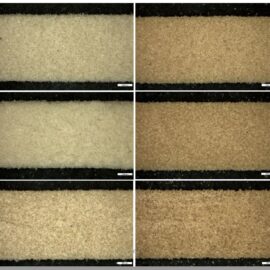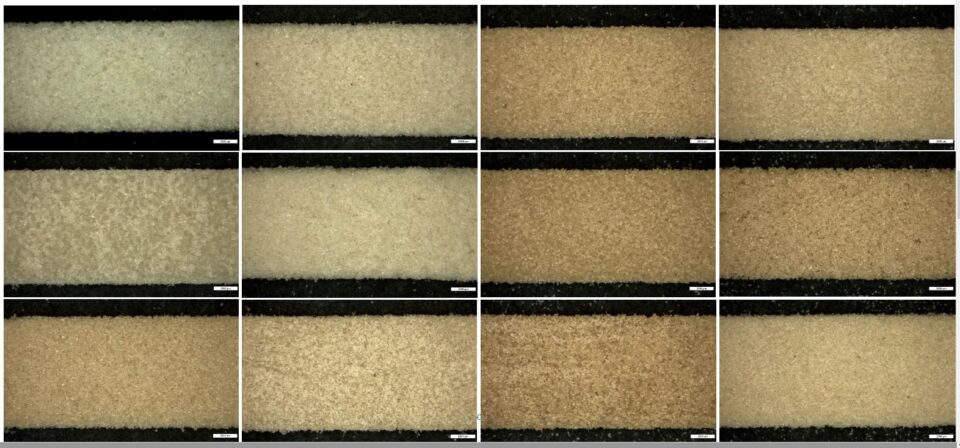
ThermoMelt4PA
Low-temperature laser sintering of fiber-reinforced PA6 with PTFE-MoS2 wear-resistant coatings for transmission componentsGenerative manufacturing (AM) offers high flexibility for lightweight construction (resource-saving use of materials) due to high freedom in function-centered construction and design and thus an alternative to conventional injection molding/die casting and CNC machining especially for small to medium-sized series - especially also for the replacement of light metal die casting by plastic composites. High cost efficiency is predicted in the future for assemblies by combining AM for small-volume, complex structures with that of conventional production of large-volume components ("hybrid production"). However, low reproducibility, slow processes and large amounts of waste due to powder aging stand in the way of efficient economic and ecological use of e.g. laser sintering processes (SLS) for high-quality, low-cost components in industrial series production.
The aim of "ThermoMelt4PA" is to solve these problems through
(1) Further development of SLS, i.e. by using the patented ThermoMelt® concept for processing polyamide PA 6 and subsequently bio-based PA 6.10 with additional usability of strength-increasing reinforcement (carbon short fibers),
(2) ThermoMelt embedding in hybrid AM production via overdeveloped design guidelines as well as
(3) combination with optimized post-processing for highly functional surfaces (i.e. wear resistance comparable to light metals).
Compared to SLS, ThermoMelt is characterized by higher laser power, but significantly lower build temperature and thus lower thermal damage ("aging") of the polymer powder used, which decisively reduces the necessary powder refreshment and thus material scrap - as recently successfully demonstrated for PEKK (aerospace use from 2020). For PA (and especially PA 6, which is widely used in industry), powder aging in the SLS process is a decisive cost factor due to the need for refreshing and the powder waste produced. In addition, ThermoMelt increases build rates and surface quality (significant smoothing). The complete melting of the powder also enables complete embedding of reinforcing fibers in the matrix. In contrast to the optimal properties in injection molding, the use of carbon fibers for SLS has so far only been described for PA 11/12 with toughness strongly dependent on porosity and thus often low creep strength, but not for PA 6/6.10 with higher sustainability.
Based on the experience gained with PEKK, the embedding of high-speed ThermoMelt technology in the hybrid AM production of PA-based components requires consideration of the entire process chain in order to meet the requirements of future customers, some of whom are associated partners from the automotive segment (i.e. manufacturers of medium-sized series for drives/components in special vehicles, emergency vehicles and vehicles for the disabled):
(1) Development of specially tailored and cost-effective powders starting from pre-compounded homogeneous composites and cryogenic mills.
(2) Process simulation for the estimation of occurring temperature (gradient) as a basis for function-centered design and processing with low residual stresses and distortion, especially for bionic topology-optimized lightweight structures, and
(3) Post-processing of fiber-filled ThermoMelt composites with wear protection coatings of lowest friction, i.e. especially thick films from low-cost large-area processes (atmospheric pressure plasma coating with the patented Inocon plasma jet) with integration of solid lubricants (PTFE, MoS2) in compounds with PA 6 with self-adaptation in the run-in, high emergency running properties without lubrication and self-healing after overload.
Final goals of the project consortium consisting of ThermoMelt equipment manufacturer and patent owner LSS, process developer and user RPD, and key competence partners in the field of 3D printing simulation (SinusPro), powder production (TCKT) and plasma jet development (Inocon Technologie GmbH) are, together with PCCL and JR as a material testing, injection molding and coating development, in addition to building up crucial equipment and process know-how for ThermoMelt, also its cost-efficient integration into future hybrid AM manufacturing chains on the basis of highly functional demonstrator components and developed design guidelines (TRL 4).





